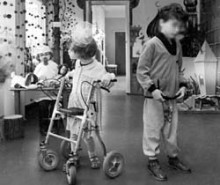Dzherela [Springs] is the name of a nonprofit organization uniting parents of physically handicapped children in Kyiv. It came out with the initiative of setting up experimental dormitories for the mentally retarded and a daycare center for those suffering from extreme mental retardation. These institutions are planned under the Turbota [Care] 2001-05 municipal program.
Rayisa Kravchenko, member of the board of the Dzherela Benevolent Association, points out, however, that despite the dedicated efforts of the municipal authorities to help children with impaired mental capabilities, the issue of their failure to adapt to society remains open. It is necessary to take a series of coordinated measures and introduce patterns of assistance that would be such individuals’ lifelong companions, preparing children for adult life. If the mental condition is such that the person cannot live unassisted, that person should be enrolled in a compact institution where the physically/mentally handicapped would live together with healthy individuals their age, in a way as close to normal as possible. Among the basic needs to be supplied are food, sleep, work, housing, protection of property interests, etc. To Ukraine’s man in the street, the notion of a home for the mentally retarded is immediately associated with an asylum. In the West, such homes differ little from places inhabited by healthy children. Children with mental conditions are members of families. After growing up they get married and try to save enough to buy their own homes. But while they study and get on their feet they live in dorms. There is a system of group homes and halfway houses for such individuals in the West. Here such institutions are known as mini-dorms. In fact, they existed under the Soviets and estimates showed that funding them amounted to about as much as that of nursing homes. Yet the living standard of children with mental problems is noticeably rising; they can independently solve their daily problems (choosing friends, food, clothes, when to go to bed, and when to get up); they can have privacy, do their homework, assisted by social workers. In addition, there are adult life planning programs in the West; parents of mentally retarded children aged between 15 and 16 are invited for interviews with district social workers to plan their children’s future after training, which will last until approximately the twenty-first year, and to determine where their children will live independently. Incidentally, such children always take part in these interviews.
In Ukraine, some of the graduates of schools for the mentally retarded are enrolled in vocational schools. Such handicapped children must be fully sustained by the state, at nursing homes, beginning at an early age.
In the West, if parents so desire, mentally retarded minors are entered on waiting lists for enrollment in group homes, daycare and labor centers or workshops, or they can try to find jobs at ordinary enterprises. Serious attention is paid to their leisure, but this happens only if the state allowance covers their basic needs.
In Ukraine, problems appear already at the stage of planning adult life for mentally retarded children. A system of comprehensive assistance at local institutions has not been completely worked out — and this is in the capital, meaning that the situation in the regions is much worse. Of course, there are positive aspects. A network of social service rehabilitation centers has started functioning over the past couple of years. These centers partially discharge the functions of daycare agencies, and much consulting and methodological help — sometimes even material aid — is provided.
Rayisa Kravchenko is convinced that there is an opportunity to receive a little help from government and non-governmental institutions; one can become a customer of a clothes bank and once a year receive a little help from several funds, arrange for visiting cultural events, cultural outings, soirees, excursions, perforce receive free consultations of specialists.
Another important issue is the attitude of society toward mentally retarded individuals (not as mental cases but primarily as individuals). The notion mentally retarded does not exist in daily use in the West. Such children are referred to as special. Here the diagnosis sounds rather like a stigma, a condemnation. The private life of such children should be approached with utmost consideration. After all, they have as much right to be respected by society, loved, and understood by their fellows, and to satisfy their physiological needs.
The continuity principle is extremely important to observe when planning help for children with mental problems; they must be supported at all stages of life. There must be plans of interference, allowing for both the afflicted individual’s needs and those of his parents. It is very important to bring services (including psychological ones) as close to the patient’s home as possible. Thus far it is a new approach for Kyiv, but a very effective one.
Setting up experimental mini-dorms for the mentally retarded and daycare centers for severely retarded people is an initiative of a public organization of the physically handicapped. This initiative can be implemented in keeping with the law On Local Self-Government. The Dzherela Benevolent Association that put forth this initiative has already received the Kyiv City Council’s decision to allocate premises to be leased for such mini-dorms and a daycare center for severely retarded children. They hope to have another decision allocating purposeful funds at the expense of the Turbota comprehensive municipal program.
Setting up a daycare center for severely retarded children will make it possible to find jobs for individuals aged over 16, conduct labor orientation courses for the mentally handicapped, and work out employee conduct stereotypes. This center will help master basic manual techniques for unskilled labor and revive skills obtained at a supplementary vocational boarding school.







